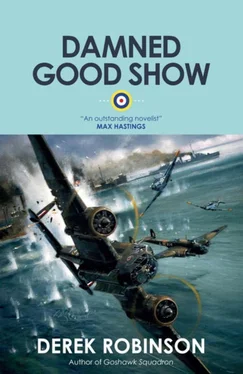“Two drums.”
“Yeah. Very nosey, he was.”
“You didn’t report this.”
“What’s the point? I couldn’t identify the bastard.”
McHarg spent a long time staring at him, before he said: “I don’t like negligent discharge. The man who squanders bullets can’t be trusted. Ammunition doesn’t grow on trees.”
“That’s a relief,” Silk said. “I was beginning to think it might be footballs after all.”
He walked back to the Mess, where a noisy party had developed, with Langham at its center. “The wedding’s definitely on, Silko! Lincoln cathedral, Wednesday week, fourteen hundred hours. My popsy fixed it. Isn’t she clever? You’re best man.”
Silk took him aside. “I think Black Mac knows something. I could tell from the way he looked at me. He’s got eyes like corkscrews.”
“Blast his eyes! We’ve got real corkscrews. Have a drink.”
“That bloody Bentley.” Silk took a glass. “How does a sweaty armaments officer come to own a Bentley, anyway?”
“Won it in a raffle. Who cares? Drink up, Silko.”
In fact McHarg had bought it for a song when it was a wreck, and then spent ten years restoring it. He had never married. The Bentley responded sweetly and without argument, went where he steered it, and was admired by all. No woman could compete with that. The Bentley was his life’s companion.
1
When half a dozen pilots were posted to 409 Squadron from an Operational Training Unit, the adjutant organized their rooms and their servants and then took them to the station commander’s office.
Group Captain Rafferty always gave an introductory talk. He liked to impress on new officers that 409 was rather special, that it had a bit of swank. He had given the talk so often that it was well-polished.
“Shakespeare was right, as usual,” he told them. “Here we are on this sceptered isle, as he put it. This fortress built by Nature for herself against infection and the hand of war. This precious stone set in a silver sea, which serves it as a moat defensive to a house, and so on and so forth. Rattling good stuff. Makes Hitler sound like a rag-and-bone man shouting in the street. Now, the current task of this squadron is to protect the moat, so let’s take a closer look at Shakespeare’s silver sea.”
Rafferty strolled over to a wall map of England and northern Europe.
“Between us and the Hun lies the North Sea. I’m sure you’re familiar with it. It has some disadvantages. It’s damned cold, damned windy, damned wet. It has one advantage: it’s damned big. You can have as much of it as you like.” That got a brief laugh. “At the moment, our job is to patrol a short beat—the German coastline between Holland and Denmark. A hundred-plus miles. But to get there you fly nearly four hundred miles. No landmarks in the sea, so good navigation is important. Get your sums wrong and you might overfly Holland or Germany. This will be indicated by anti-aircraft fire. If you observe shellbursts in your vicinity, make an excuse and leave. You are searching for ships, not shrapnel.”
He talked about the Roosevelt Rules, about neutrality, about the crucial importance of positively identifying warships as German before dropping any bombs. He talked of what to do if British antiaircraft guns shot at them: fire off signal flares in the colors of the day. “You never know,” he said. “It might work.” But stay well away from the Royal Navy, he said. Sailors were notoriously quick on the trigger, and he had scars from the last war to prove it. As for German fighters: they never went to sea. But if you met a Hun, keep in close formation and your gunners’ crossfire should make him think twice about attacking.
This was useful stuff, but not thrilling. So Rafferty ended on a note of brisk patriotism. “I envy you chaps,” he said. “You’ve got the best bomber in the world. Best crews. Fighting for the best country. I began with Shakespeare, so I’ll end with him. Henry V, before Agincourt, sees his army. ‘This happy breed of men,’ he says. And Henry knew what they were fighting for: ‘This precious stone set in a silver sea.’ Of course we won! How could we lose? And with chaps like you, we’ll win again.”
That seemed to go down well. A few men actually smiled.
“Any matters arising?” he said. Feet shuffled. Somebody coughed. “Anything? Anything at all.” Silence. “Well, then…”
“One small thing, sir.” A tallish officer took a pace forward. Strong features. Thick hair. Deep, confident voice. “Those lines from Shakespeare. They’re not Henry V . They’re Richard II. Act two, scene one.”
“Oh.” Rafferty was taken aback. “Not Henry, you say. But still… um… relevant, surely?”
“Not relevant to Agincourt, sir. Wrong century.”
“I meant relevant to patriotism,” Rafferty said smoothly. “To England.”
“Relevant to treachery,” the pilot said, “if Shakespeare is to be believed. But of course the king doesn’t speak those lines. He’s not present. The speech comes from his uncle, John of Gaunt.”
The officers relaxed; they were enjoying this. Rafferty was outgunned. He gestured: carry on.
“Well, sir, Gaunt makes such a fuss about ‘this sceptered isle’ in order to contrast its past with its present, which he says is rotten and he leaves no doubt who’s to blame: the King! Richard has pawned the country. England, Gaunt says, ‘is now bound in with shame, with inky blots, and rotten parchment bonds: that England, that was wont to conquer others, hath made a shameful conquest of itself.’”
“Interesting,” Rafferty said.
“Smashing speech,” the pilot said. “But I wouldn’t describe it as a ringing endorsement of the Crown.”
“You were an actor, I take it.”
“Briefly, sir.”
“And your name is…”
“Gilchrist, sir.”
“Are you as good a pilot as you were an actor?”
“I was a lousy actor, sir. That’s why I became a pilot.” It made them laugh. Rafferty smiled, and dismissed them. He had recovered his poise, but he still blamed Gilchrist for spoiling his talk. He blamed Shakespeare, too. The Bard had let him down.
2
Rafferty told the Wingco that the new boys seemed a reasonable lot, although one, a chap called Gilchrist, was rather full of himself. A bit cocky.
“Good,” Hunt said. “I’m laying on some cross-country flights and bombing practice for ‘A’ Flight. This Gilchrist can navigate for Flying Officer Duff. That should keep him quiet.”
When he was listed as Duff’s observer, Gilchrist went to see his flight commander, an Australian squadron leader called Tom Stuart. In his youth Stuart had fallen off several horses, which was why his nose was bent. His hair was silver-gray because everyone in his family had silver-gray hair. He was twenty-six. Gilchrist thought he was forty.
“Sir, I think you should know,” Gilchrist said. “I’m not too hot at navigating.”
“It’s bloody difficult. Last week my observer got lost in Lincoln. Said he’d meet me in the saloon bar of the Turk’s Head. Never turned up. Doesn’t know left from right. Raise your right arm.” Gilchrist did. “You’re halfway home already,” Stuart said. “I’m very impressed.”
“This may be a silly question, sir, but… am I here as a pilot?”
“Maybe. You’re certainly not going to be allowed to drive a Hampden, not yet. It’s too valuable, you might scratch the paint.”
Gilchrist tracked down Duff and warned him that he wasn’t a very good navigator. “You can’t be any worse than me,” Duff said. He was playing chess with Langham. “I can never remember how to plot a course. To calculate distance, d’you divide time by speed? Or do you multiply?” He moved his bishop straight up the board. Langham put it back. “Bishop moves diagonally,” he said. Duff made a face. “See what I mean?” he said to Gilchrist. “Nothing’s easy.”
Читать дальше












